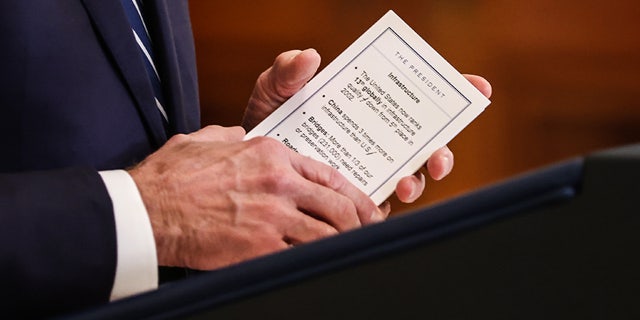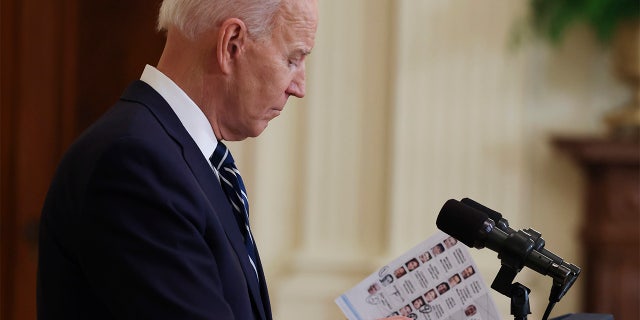What an achievement....the press conference is stacked with leftist friendly reporters...questions were fed to him in advanced...and he had que cards....and the questions are all soft ball questions and he still have difficulty answering them....C'mon Man....
https://theweek.com/articles/973304/bidens-early-successes-prove-experience-matters
Biden's early successes prove experience matters

Joel Mathis
Illustrated | Getty Images, AP Images, iStock
March 22, 2021
SIGN UP FOR
Our free email newsletters
10 things you need to know todayToday's best articlesToday's top cartoonsThe good news newsletterThe week's best photojournalismDaily business briefingDaily gossip newsletterParenting newsletterSolving COVID newsletter
During the 2020 presidential election, Joe Biden's opponents tried to make the case that he had been in Washington for far too long, and not always to great effect. His then-future vice president, Kamala Harris,
raked him over the coals during a Democratic primary debate for speaking fondly of his work with segregationist senators during the 1970s. Donald Trump followed up in the general election by
blaming Biden for all of the country's problems that didn't get solved during Biden's
half-century of public service as senator and vice president.
"I did more in 47 months as president than Joe Biden did in 47 years," Trump said last year.
Underlying both attacks was a
not-always-subtle suggestion that maybe this guy was just too
old, and that time — along with America's political culture — had passed him by. Biden, though, is demonstrating that his long tenure in government is a good thing.
ADVERTISEMENT
His administration has hit the ground running. Two months after Biden's inauguration, the government has already surpassed his initial goal of distributing 100 million COVID vaccine doses in 100 days — beating
the deadline by more than a month — but the White House also spearheaded passage of a
$1.9 trillion relief bill to support those efforts and alleviate the economic damage done by the pandemic. And he has signed far more
executive orders than any of his 21st-century predecessors had by this point in their presidencies, addressing policy on everything from health care to climate change to for-profit prisons.
That's a lot of work in a fairly short time.
MORE PERSPECTIVES

DAMON LINKER
The pandemic blame game

BONNIE KRISTIAN
Would Boulder's assault weapons ban really have made a difference?
Biden had a couple of advantages in achieving these successes.
Timing, for one — Pfizer announced its vaccine was effective and ready for use the same weekend the TV networks declared him the winner of the presidential race. And his party has control of both houses of Congress, if
just barely, which made passing the relief bill possible. But it is likely that Biden's early effectiveness is attributable, in part, to the fact that he and his team already know the ropes.
Americans and the media tend to focus on a president's first 100 days in office, but running the country is a big job and not that easy to do well right out of the gate. Biden's recent predecessors certainly needed a bit of on-the-job training. Trump entered office so dismissive of governance (and with such
little expectation of actually winning office) that he
blew off the presidential transition, then tried to rule by
decree and whim, only to see those efforts
knocked back by the courts. Bill Clinton arrived at the White House and almost immediately found
his administration embroiled in scandal and unable to pass it's biggest
legislative goal — he didn't really find his footing until two years into his first term, when Republicans captured Congress. Even Barack Obama had some
early stumbles.
None of those men came to office with much of a resume in federal government. Obama had been senator for four years, but had spent half that time seeking higher office, and his legislative record was scant. Clinton came to the presidency straight from governing Arkansas; George W. Bush similarly went straight from Austin, Texas, to Washington, D.C. Trump, of course, had never spent even one second of his life in public service before becoming commander-in-chief.
So Biden is the first president since George H.W. Bush to enter the Oval Office with extensive experience at the federal level. (Both men had served as vice president, and each had previously been in Congress — Biden as a senator, Bush as a congressman.) Unlike most successful candidates since Richard Nixon resigned in disgrace after Watergate, Biden didn't campaign for office by running against the culture of D.C. It wouldn't have been believable, given he arrived in the city four years before Jimmy Carter became president, but the approach also meshed with his goal of
restoring Americans' faith in government after four years of Trump's Twitter-driven culture wars.
"I'll be as straight with you as I can. I think I'm the most qualified person in the country to be president,"
he said in 2018, while he was still contemplating whether or not to challenge Trump. "The issues that we face as a country today are the issues that have been in my wheelhouse, that I've worked on my whole life."
ADVERTISEMENT
The early returns appear to bear out that self-assessment. Biden not only understands how his job works, he has been around long enough to avoid some of the pitfalls. Having watched up-close as Obama settled for a too-small stimulus during the dark days of the Great Recession in 2009 — which resulted in a
slow recovery that
proved painful for Democrats — he decided to "
go big" with the COVID relief bill, much to the relief of progressives. And he has surrounded himself with a team of
similarly experienced professionals.
Experience isn't the only determinant of presidential success. Biden might still be prone to old ways of thinking, particularly in foreign policy — he seems to have stuck with a hardline policy
toward Iran, for example, and his administration will probably scuttle America's commitment to
withdraw troops from Afghanistan by May 1. Some problems are intractable: Immigration, which has challenged U.S. presidents for decades, is once again taking
center stage in our political debates. And concerns about the 78-year-old president's age and health probably won't ever entirely go away.
So far, though, it looks as though President Biden came to the White House ready and able to do his job effectively, and Americans are benefitting as a result.
Try 6 Risk-Free issues of The Week






